Last batch roasted 12/06/2025
Extremely fresh crop Ethiopia from the legends at Daye Bensa. This lot from Rumudamo underwent an extra 96 hrs of held in cherry fermentation in an anoxic environment before pulping, washing and drying on raised beds - we're finding it extraordinarily clean with minimal pulpy flavours, but maximum florality.
Part of our LCF special release series.
Brew Guide:
Best Brewed with: Filter
Lightest Influence: Extremely fast roasting to maximise brightness. This roast style requires rest to open up, but it's maximising the delicate complexity of this lot.
Best Rested: 3-4 weeks
Filter: 60g/L, 98°C when fresh but when well rested you can go down to 92-93°C
Espresso: 18g/50g/20s - turbo shots. May have enough fines generation to run a tighter yield, but will be quite acid forward
We’re tasting: Super bright, juicy and clean. Ripe white peach, the citrus bite of bergamot alongside clementine, kaffir lime leaf, cherry blossom & brioche, as it cools becoming like a rose & hibiscus floral tisane. As it cools the floral tea element becomes more like milk oolong. Structured, elegant and super complex
Traceability
Country of Origin: |
Ethiopia |
Region: |
Arbegona, Sidama |
Producer: |
600 smallholder farmers selling cherry to Rumudamo, which is managed by Asefa Dukamo Korma |
Station: |
Rumudamo |
Variety: |
Primarily JARC 74112, alongside 74110 and 74158 |
Elevation: |
2100- 2330 MASL, station at 2200 MASL. |
Process: |
Anoxic Washed: Ripe cherries delivered to Rumudamo and floated/sorted before being placed in sealed barrels for a 96 hr* fermentation in an anoxic enviroment. Cherries then pulped & washed, before drying on raised beds, with continual sorting and shade temperature control. *The initial round of bags sent out are marked as a 120 hr ferment; whilst this is the standard protocol at Rumudamo for Anoxic washed lots, this year's weather conditions meant they ran a shorter fermentation. |
Import Partner: |
Coffee Legends via Daye Bensa |
Harvest |
24/25 - Arrived UK: May 9th, 2025 |
The Story
We were incredibly lucky to get this lot. It's extremely expensive to courier packages from Ethiopia to the UK - as a result, offer and pre-shipment sample material tends to be in extremely short supply* if you're working with an importer (if you want more - the best way is to fly out and bring it back in your suitcase). What many importers have turned to, rather than sending out swathes of green samples in the hope someone might make a sale - is to run public cuppings where multiple roasters can come and try at once, a far more efficient stretching of the meagre available lots
Atrie kept teasing us - putting down the special preps from the Daye Bensa stations, extremely small outturns, but outrageously good. We've always been ready to commit early to secure, but in each case we've been long pipped to the post - buyers in the Middle east & Asia snaffle these lots before there's even a chance they could be allocated to the UK container. It's one of those rare occasions where a trip to origin would be the best way to secure these coffees.
For once - we tried an outrageous banger, confirmed we wanted it there and then - and managed to lock it down. There was only 60kg available and we got all of it - but what a great start to the Ethiopia season.
*Typical sample volumes if you're confirming a container might be 350g of green coffee. If you're an importer looking to pre-sell coffees, maybe you might like to get a kilo or more, so you can distribute 50-100g samples to roasters. Typically much easier to pull samples from a lot once it lands and is "to hand" - but by then, it's your landed coffee from this origin vs everyone else's landed coffee, and finding buyers early is the best way to reduce risk.
Rumudamo, Daye Bensa & Coffee Legends:
We’ve made a commitment to try and work with producer owned value chains wherever possible. This means that those that grow the coffee, also manage the exporting and importing process ensuring that the maximum value for our purchase is returned upstream. This means both working with smaller independent outfits, as well as larger operations.
Daye Bensa was founded by two brothers - Asefa and Mulugeta in 1996, setting up a farm and washing station in the Bensa region of Sidama. Initially only selling internally (as Ethiopia has a strong internal market for coffee - around 50% of what is grown in Ethiopia never leaves its borders), in 2006 they started exporting coffee internationally. Since then, Daye Bensa has grown to be one of the top 5 largest international exporters by volume (and most assuredly higher by quality!) in Ethiopia, but still to this day family owned and based in-country.
Atrie from Coffee Legends is Asefa’s brother in law - having worked as a manager for Daye Bensa, with a stint in finance in the UK, he took the leap to set up a UK import office for Daye Bensa. Atrie’s mission is to specifically highlight and promote the Arbegona region of Sidama - a relatively youthful area for coffee production.
Arbegona represents an interesting example of the future of coffee - but perhaps not as we would like to see. It is no secret that Arabica coffee trees are fussy plants - even in their native Ethiopia, they have a defined climactic range in which they flourish. They thrive best with daytime temperatures no higher than 25-30c, with a cooler nighttime temperature. As global and local temperatures crank ever upwards, coffee production in lower altitudes is in crisis - the heat stress diminishing yields, increasing susceptibility to disease and insect damage, and when we consider cup attributes, hotter temps lead to rapid cherry maturation and poor quality. Slowly but surely lower altitude regions no longer become suitable for growing coffee as the global temps rise.
Arbegona is an example of the counter-point of this - as temperatures rise and lower altitude areas become unsuitable, regions that were previously too high and too cold for production become viable. Arbegona is home to higher elevations than the surrounding classic woredas of Sidama, elevations that common wisdom over 30 years ago would have said no coffee would grow. But as temperatures rise, farmers have had success growing extremely high altitude coffee - some of the highest grown in the world.
Unlike other regions with longer histories, the majority of coffee production in Arbegona is recent plantings, mostly Jimma Agricultural Centre improved cultivars (as opposed to a mixture of JARC and local selected landraces). This means we can be very confident in discussing which varieties have built the lot, and we see a more defined flavour profile from the 3 JARC varieties typically planted in the region. Secondly, the extremely high altitude is still not completely conquered by the rising climates - cooler nights ensure that cherry maturation is a slow process, and often the cherries themselves are incredibly small. Dense, tiny beans but packed full of intensity and flavour from the conditions. It’s no wonder when you combine this with quality focused protocols and processing that Arbegona is quickly picking up a reputation for top, top quality production, a reputation to rival the most storied kebeles.
But it’s tinged with mourning - while we gain access to new regions inside the motherland of coffee, with incredible and distinct profiles, the lingering thought always returns - what happens when “low altitude conditions” cover the majority of the coffee lands across the globe, and there are no more mountains to climb?

![[72] Ethiopia - Rumudamo Anoxic Washed [CROP 24/25 ARCHIVE]](http://scenery.coffee/cdn/shop/articles/ethiopia_rumudamo_anoxic_washed_shopify_34fb7246-25cb-4a32-afab-c89336acbbe4.png?v=1752833947&width=1100)
![Colombia - Quebraditas Ají Thermal Shock Washed [FESTIVE SPECIAL] 🎄](http://scenery.coffee/cdn/shop/files/colombia_quebraditas_aji_shopify.png?v=1764358600&width=533)
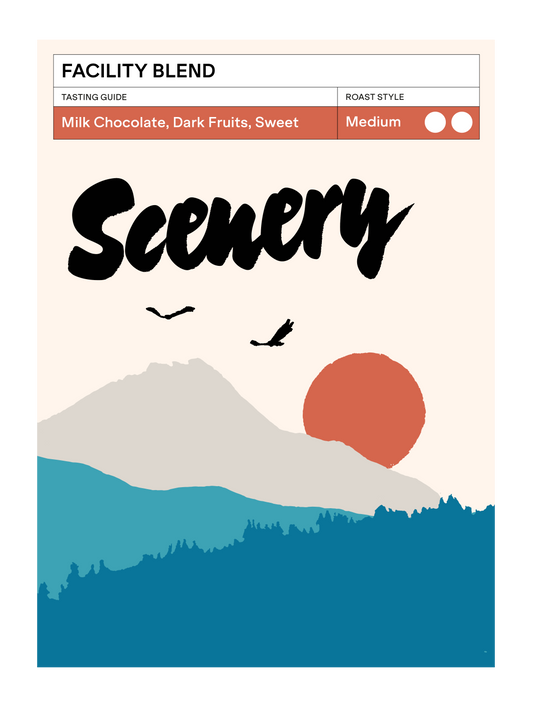
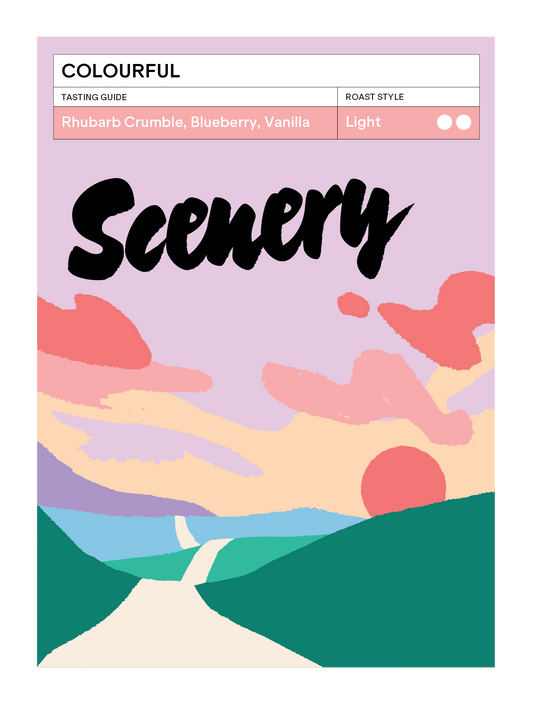
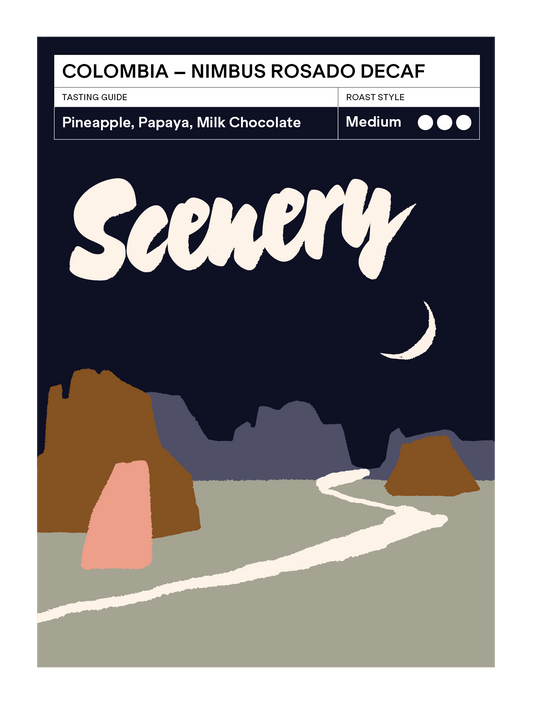

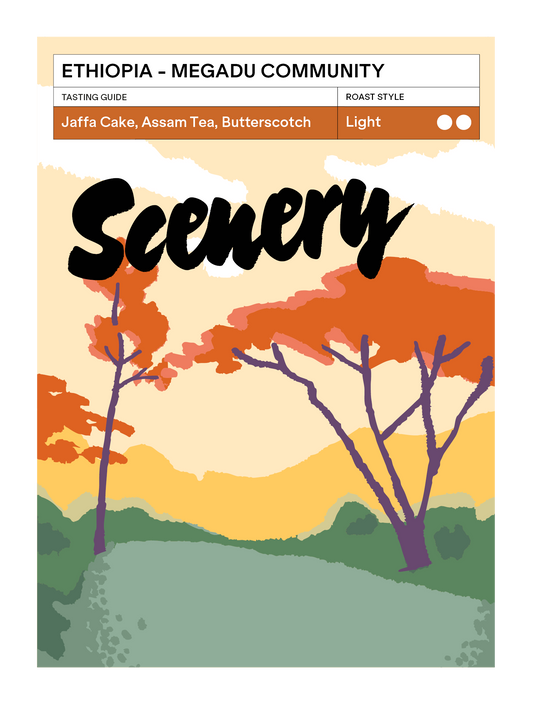

![Colombia - Quebraditas Sidra Thermal Shock Washed [25/26]](http://scenery.coffee/cdn/shop/files/colombia_quebraditas_sidra_2526_shopify.png?v=1765544630&width=533)



![Colombia - Luz Ángela's Chiroso [25/26]](http://scenery.coffee/cdn/shop/files/colombia_luz_angela_chiroso_2526_shopify.png?v=1764359755&width=533)

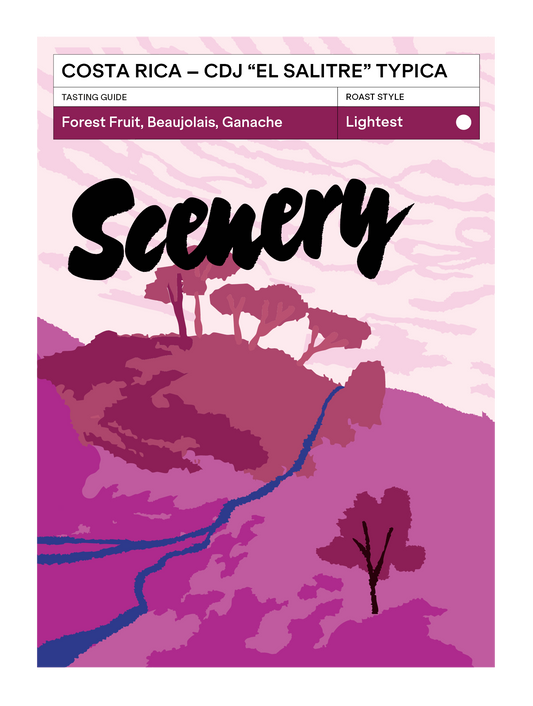
![Colombia - El Jaragual Rosado [25/26]](http://scenery.coffee/cdn/shop/files/el_jaragual_rosado_2526.png?v=1757075842&width=533)